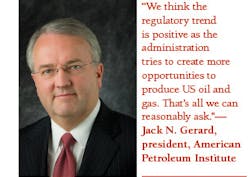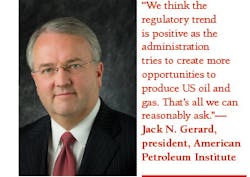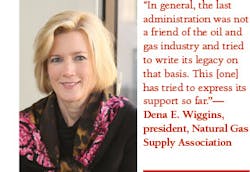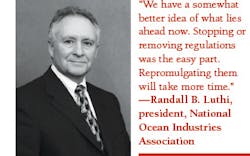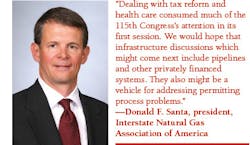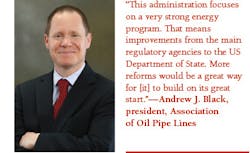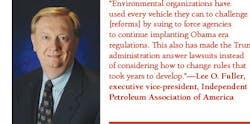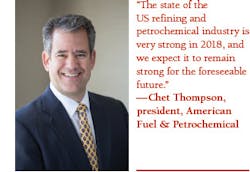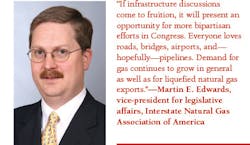The US oil and gas industry may have entered 2017 not entirely certain whether the new presidential administration would deliver promised policy changes from its predecessor's climate-centered approach. But its leaders ended the year generally satisfied with what the Trump White House and 115th Congress had done, from the first substantial federal tax reform in more than 3 decades, which preserved vital capital recovery provisions, to regulatory reforms that they felt would begin to restore some balance to the system.
They also are ready to build on 2017's successes. "We're focused on what needs to be done. We're looking at broader principles, and we still have a lot of work to do," American Petroleum Institute Pres. Jack N. Gerard told reporters during a press conference following his Jan. 9 State of American Energy address.
"We think the regulatory trend is positive as the administration tries to create more opportunities to produce US oil and gas. That's all we can reasonably ask," he added.
Yearend federal tax reform posed some challenges because the industry is highly capital intensive, but Congress and the administration kept most of the federal tax code's cost recovery provisions, Gerard said. "Don't forget that our companies also benefited from the federal corporate tax rate's reduction from 35% to 21%. That's significant," he noted.
Independent Petroleum Association of America officials began to visit the White House soon after the new administration arrived to explain why the cost-recovery provisions matter so much to independents. "Our staff members worked through the year. Their experience kept us in the process and let us, for example, explain differences between a small, 10-person operation and a larger producer," IPAA Pres. Barry Russell told OGJ on Jan. 5.
"As the bill took form, Congress kept key provisions intact, even though it had to step back from full expensing," said IPAA Executive VP Lee O. Fuller. "Other, such as enhanced oil recovery, didn't change because they had little impact. The marginal well exemption had not been used much in the last decade. But the bill had other useful features such as its repeal of the Alternative Minimum Tax and an effort to find parity between corporate and pass-through tax rates. This matters because many smaller independents file as individuals."
Focus now on implementation
"We appreciate the tax reform bill, but we need to focus now on how it's implemented," American Fuel & Petrochemical Manufacturers Pres. Chet Thompson said at the US Energy Association's 14th annual State of the Energy Industry Forum on Jan. 18.
AFPM's members were pleased that direct expensing and last in-first out accounting remained in the federal tax code, but were most relieved that a border adjustment tax, which was discussed early in 2017 as a way to help offset a broader corporate tax rate decrease, was not adopted, he told OGJ a day later.
"In general, the last administration was not a friend of the oil and gas industry and tried to write its legacy on that basis. This administration has tried to express its support so far," Natural Gas Supply Association Pres. Dena E. Wiggins said on Jan. 22.
Early on, it rescinded an Obama White House policy under which the Council on Environmental Policy imposed guidance for federal agencies, she told OGJ. "I don't think a National Environmental Policy Act review requires such an extensive upstream and downstream analysis," Wiggins said.
"We have a somewhat better idea of what lies ahead now," National Ocean Industries Association Pres. Randall B. Luthi said on Dec. 27. "Stopping or removing regulations was the easy part. Repromulgating them will take more time. Many rules involving well control which were adopted following the Macondo deepwater well accident in 2010 went too far. Industry welcomes the opportunity to discuss this again."
The offshore oil and gas industry welcomed the Safety and Environmental Management Systems approach which the US Department of the Interior implemented but would prefer a less prescriptive approach which would let more participants address the well containment problem more effectively, he told OGJ. "The 0.5 ppg requirement was one instance. It was right for some wells, but not all. Variances were an almost inevitable solution," Luthi said.
Infrastructure and permitting
Other trade association officials said they would like to see federal permit application processes improved. "We would like to see agencies aligned in siting and permitting work more closely together," Interstate Natural Gas Association of America Pres. Donald F. Santa said on Jan. 4. "Dealing with tax reform and health care consumed much of the 115th Congress's attention in its first session. We would hope that infrastructure discussions which might come next include pipelines and other privately financed systems. They also might be a vehicle for addressing permitting process problems."
Local opposition to proposed pipelines remains a factor, he continued. "Construction of any infrastructure affects those who live near it. What's different is new lines from the Utica and Marcellus fields cross more urban areas. Also, pipelines carry different cargoes-not just oil and gas, but also natural gas liquids. Finally, social media have turned local stories into national questions. The pipeline industry realizes this is the New Normal for developing energy infrastructure," Santa told OGJ.
Association of Oil Pipelines Pres. Andrew J. Black observed that 2017 finally brought overdue federal approvals for Dakota Access and Keystone XL projects and expressed hope that authorities will continue improving the process. "This administration focuses on a very strong energy program. That means improvements from the main regulatory agencies to the US Department of State," he told OGJ on Jan. 5. "More reforms would be a great way for this administration to build on its great start."
The US Forest Service announced that it was reforming its policy under NEPA, but pipeline operators sometimes are encountering inexplicable delays in performing maintenance on existing lines crossing USFS land, added John Stoody, AOPL executive vice-president for government relations. He said that the outlook has improved now that new US Pipeline and Hazardous Materials Safety Administrator Howard (Skip) Elliott is in place. "He seems ready to fund much of the research and development we'd like to see take place on smart pigs and leak technologies that listen for potential leaks," Stoody said.
Last year was remarkable in another respect as federal agencies continued to function well despite lacking their appointed leaders, Santa pointed out. "That's particularly true when you consider how long it took for the Federal Energy Regulatory Commission to regain a quorum. Part of the blame lies with the previous administration, which did not move to fill the first two vacancies," he said.
FERC's reexamination welcome
Environmental and other organizations also have accused FERC of not conducting sufficiently stringent permit reviews, which Wiggins disputed. "It's rigorous and thorough, as anyone who has been through one will tell you," she maintained. NGSA's president nevertheless welcomed FERC Chairman Kevin J. McIntyre's announcement that the commission plans to re-examine its operations but suggested this should include its enforcement division. "We're not saying this should be dismantled. FERC should continue to go after bad actors who try to manipulate the market," Wiggins said.
AFPM's Thompson said that US Environmental Protection Agency Administrator E. Scott Pruitt "is the right guy for the job right now. He is doing reasonably well since he hasn't been able to get his entire team in place. He keeps his head down and moves ahead despite strong criticism. EPA had strayed from the authority Congress gave it. Scott Pruitt is calling it out."
But Thompson added that it will be necessary for Congress itself to address problems with the federal Renewable Fuel Standard. Merchant refineries such as those operated by Philadelphia Energy Solutions have been hit hard by high Renewable Identification Number prices, he told OGJ on Jan. 19. PES announced 2 days later that it was going into bankruptcy because of its costs for the renewable fuel credits to comply with RFS quotas.
US Sen. Ted Cruz (R-Tex.) raised the issue early in 2017, which led to a meeting with the new president and subsequent discussions with members of both parties in the House and Senate, Thompson said. "We expect some legislation to emerge that will put this issue out there. Everyone in Congress is beginning to understand that this is a problem," he said.
IPAA's Fuller said that DOI agencies have made more progress reforming regulations than EPA, where it has been harder. "Environmental organizations have used every vehicle they can to challenge this by suing to force agencies to continue implanting Obama era regulations," he told OGJ. "It also has made the Trump administration answer lawsuits instead of considering how to change rules that took the Obama administration years to develop. It shows how intense opposition will be to moving regulations back to a more traditional state-federal balance."
Regulating gathering lines
Congress also may have to step in if the US Pipeline & Hazardous Materials Safety Administration tries to regulate gathering lines, said Susan B. Ginsberg, IPAA senior vice-president for regulatory affairs. "It's important to determine where production, which PHMSA doesn't regulate, begins and gathering ends," she said. "In the past, gathering was defined by function and not pressure or pipeline size. That becomes difficult when pressure from unconventional production is so high and may pose a greater risk. We would rather not see PHMSA try to regulate all gathering lines when states already do a good job on 8-inch diameter systems."
The gathering line question also concerns members of the GPA Midstream Association, Vice-Pres. of Government Affairs Matthew Hite told OGJ on Jan. 12. "We have processing plants, but our gathering lines cover a lot of miles requiring a separate permit. We may not be the first call when a producer makes a commercial discovery. But we're the second or third because we build gathering lines out to INGAA's members once we complete the processing," he said.
While most trade association officials applaud giving states more regulatory responsibility, several said that some are using federal authority they already have to thwart transportation projects which FERC has approved. "Right now, we have problems with Clean Water Act Section 401 water quality authority uses in some states, notably in New York. If this is not addressed, it may be time to take another look at the CWA," Wiggins said.
"If infrastructure discussions come to fruition, it will present an opportunity for more bipartisan efforts in Congress," said Martin E. Edwards, INGAA vice-president for legislative affairs. "Everyone loves roads, bridges, airports, and-hopefully-pipelines. Demand for gas continues to grow in general as well as for liquefied natural gas exports."
Charlie Riedl, executive director at the Center for Liquefied Natural Gas, confirmed this. "We're increasing exports, but we're doing so while not affect prices at home," he told OGJ on Jan. 18. "More projects are being built for a specific purpose instead of massive installations whose sponsors then went looking for long-term customers. The next round will be more modular, making them easier to finance and increasing their flexibility."
Withstanding weather events
Association officials also said that their member companies continued to provide service despite weather events ranging from Hurricane Harvey to the recent cold snap. While gas prices jumped to $16/Mcf after Hurricanes Katrina and Rita tore through the Gulf Coast in 2005, they did not change following Harvey, Wiggins noted. One reason is that supplies are more diverse now, with production from Pennsylvania and other shale formations that keep abundant gas flowing, she said.
"The recent cold weather put our natural gas system to the test, just as Katrina and Harvey did, but it passed with flying colors," Wiggins continued. "We at NGSA believe a diverse fuel mix is in the nation's best interest. It's never been more diverse than it is today."
Thompson said that refineries and petrochemical plants also performed well in Harvey's wake. The storm knocked out 25% of the country's total refining capacity and 60% of its petchem capacity, he pointed out at the USEA conference. "This could have been catastrophic, but it wasn't. There were some minor price impacts," Thompson said. Within 2 weeks, 20 of the 24 Gulf Coast refineries were back online, and 70% of the petchem manufacturing was back 3 weeks later.
The storms nevertheless exposed transportation vulnerabilities, he told OGJ. "Harvey showed how important pipelines are. Colonial and other systems were lost, keeping products from consumers. Harvey and Irma also took ports down, keeping products from being exported. Florida depends on water transportation because it has no pipelines coming into the state. We pushed barges into the Gulf of Mexico and Atlantic Ocean to have them ready until ports reopened," he said.
US refineries exported 75 billion gal of refined products to 100 countries worldwide in 2017, and the US production of base chemicals is expected to increase 20% by 2020, he reported. "The state of the US refining and petrochemical industry is very strong in 2018, and we expect it to remain strong for the foreseeable future," Thompson maintained.
"As the 2018 elections approach, it is our view that we must all stay focused on solutions for the American consumer and work together regardless of political party," API's Gerard said in his State of American Energy address. "The stakes are high, and together we are bringing the benefits of our nation's energy renaissance to all. From supporting more jobs and lower energy costs to ensuring clean air and water, energy is not a partisan issue. We share a common vision for our future: one that includes clean, reliable and abundant energy, economic prosperity, and continued environmental progress."
About the Author

Nick Snow
NICK SNOW covered oil and gas in Washington for more than 30 years. He worked in several capacities for The Oil Daily and was founding editor of Petroleum Finance Week before joining OGJ as its Washington correspondent in September 2005 and becoming its full-time Washington editor in October 2007. He retired from OGJ in January 2020.
